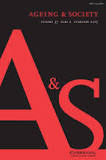Constructions of frailty in the English language, care practice and the lived experience
The way frailty is conceptualised and interpreted has profound implications for social responses, care practice and the personal experience of care. This paper begins with an exegesis of the concept of frailty, and then examines the dominant notions of frailty, including how ‘frailty’ operates as a ‘dividing-practice’ through the classification of those eligible for care. The definitions and uses of ‘frailty’ in three discursive locations are explored in: (a) the Oxford English Dictionary, (b) the international research literature, and (c) older women’s accounts of their lived experience. Three distinctive discourses are found, and applying a Foucauldian analysis, it is shown that the differences reflect overlaps and tensions between biomedical concepts and lived experiences, as well as negative underlying assumptions and ‘subjugated knowledge’. The concept of frailty represents and orders the context, organisational practices, social representations and lived experiences of care for older people. The evidence suggests that if, as the older women’s accounts recommended, socially- and emotionally-located expressions of frailty were recognised in addition to the existing conceptions of risk of the body, frailty might no longer be thought of primarily as a negative experience of rupture and decline. To encourage this change, it is suggested that practice focuses on the prevention of frailty and associated feelings of loss, rather than reinforcing the feelings and experiences which render a person ‘frail’.

